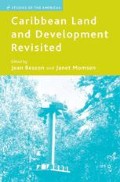Abstract
Anthropologists, geographers, and sociologists working in the Caribbean have recognized a form of customary, kinship-based, land tenure among Afro-Caribbean people, often referred to as family land, beginning with Edith Clarke’s groundbreaking work in Jamaica in the 1950s.1 Since this early work, important contributions to the understanding of the history, meaning, and function of this type of customary land tenure have been made by Wilson2 in Providencia, Besson,3 Carnegie,4 and McKay5 in Jamaica, Rubenstein6 in St. Vincent, Barrow,7 Crichlow,8 and Dujon9 in St. Lucia, Fog Olwig10 in Nevis and St. John, and Maurer11 in the British Virgin Islands.
Access this chapter
Tax calculation will be finalised at checkout
Purchases are for personal use only
Preview
Unable to display preview. Download preview PDF.
Notes
Edith Clarke, My Mother Who Fathered Me: A Study of the Family in Three Selected Communities in Jamaica. 2nd ed. (London: George Allen and Unwin, 1966).
Peter J. Wilson, Crab Antics: The Social Anthropology of the English-Speaking Negro Societies of the Caribbean (New Haven: Yale University Press, 1973).
Jean Besson, “Family Land and Caribbean Society: Toward an Ethnography of Afro Caribbean Peasantries,” in Elizabeth Thomas-Hope (ed.), Perspectives on Caribbean Regional Identity, Monograph Series No. 11 (Liverpool: Liverpool University Press, Centre for Latin American Studies, 1984), 57–83
Jean Besson, “Family Land as a Model for Martha Brae’s New History: Culture Building in an Afro-Caribbean Village,” in Charles V. Carnegie (ed.), Afro-Caribbean Villages in Historical Perspective (Kingston, Jamaica: African-Caribbean Institute of Jamaica, 1987)
Jean Besson, “A Paradox in Caribbean Attitudes to Land,” in Jean Besson and Janet Momsen (eds.), Land and Development in the Caribbean (London: Macmillan, 1987), 13–45
Jean Besson, Martha Brae’s Two Histories: European Expansion and Caribbean Culture-Building in Jamaica (Chapel Hill and London: University of North Carolina Press, 2002).
Christine Barrow, Family Land and Development in St. Lucia (Cave Hill, Barbados: Institute of Social and Economic Research, University of the West Indies, 1992).
Veronica Dujon, “National Actors against World Market Pressures: Communal Land, Privatization and Agricultural Development in the Caribbean” (PhD dissertation, University of Wisconsin, Madison, 1995).
Karen Fog Olwig, “Cultural Complexity after Freedom: Nevis and Beyond,” in Karen Fog Olwig (ed.), Small Islands, Large Questions: Society, Culture and Resistance in the Post-Emancipation Caribbean (London: Frank Cass, 1995), 100–120
Karen Fog Olwig, “Caribbean Family Land: A Modern Commons,” Plantation Society in the Americas IV, nos. 2 and 3 (1997): 135–158
Karen Fog Olwig, “Caribbean Place Identity: From Family Land to Region and Beyond,” Identities 5, no. 4 (1999): 435–467.
Bill Maurer, “Fractions of Blood on Fragments of Soil: Capitalism, the Commons, and Kinship in the Caribbean,” Plantation Society in the Americas IV, nos. 2 and 3 (1997): 159–171.
M. G. Smith, “The Transformation of Land Rights by Transmission in Carriacou,” Social and Economic Studies 5, no. 2 (1956): 103–138.
Beth Mills, “Agriculture and Idle Land in Carriacou, Grenada with a Case Study of the Village of Harvey Vale” (unpublished MA thesis, University of New Mexico, 1987).
Beth Mills, “Family Land in Carriacou, Grenada and Its Meaning within the Transnational Community: Heritage, Identity, and Rooted Mobility” (unpublished PhD dissertation, University of California, Davis, 2002), 154–170.
Jean Besson, “Symbolic Aspects of Land in the Caribbean: The Tenure and Transmission of Land Rights among Caribbean Peasantries,” in Malcolm Cross and Arnaud Marks (eds.), Peasants, Plantations and Rural Communities in the Caribbean (Guildford: University of Surrey and Leiden Royal Institute of Linguistics and Anthropology, 1979), 86–116; and Olwig, “Caribbean Family Land,” 136.
Donald Hill, “The Impact of Migration on the Metropolitan and Folk Society of Carriacou, Grenada,” Anthropological Papers of the American Museum of Natural History 54, no. 2 (1977): 218–227.
Beth H. Mills, “The Transnational Community as an Agent for Caribbean Development,” Southeastern Geographer 45, no. 2 (2005): 174–191.
Editor information
Copyright information
© 2007 Jean Besson and Janet Momsen
About this chapter
Cite this chapter
Mills, B. (2007). “Leave to Come Back”: The Importance of Family Land in a Transnational Caribbean Community. In: Besson, J., Momsen, J. (eds) Caribbean Land and Development Revisited. Studies of the Americas. Palgrave Macmillan, New York. https://doi.org/10.1057/9780230605046_18
Download citation
DOI: https://doi.org/10.1057/9780230605046_18
Publisher Name: Palgrave Macmillan, New York
Print ISBN: 978-1-349-53460-9
Online ISBN: 978-0-230-60504-6
eBook Packages: Palgrave Political & Intern. Studies CollectionPolitical Science and International Studies (R0)

